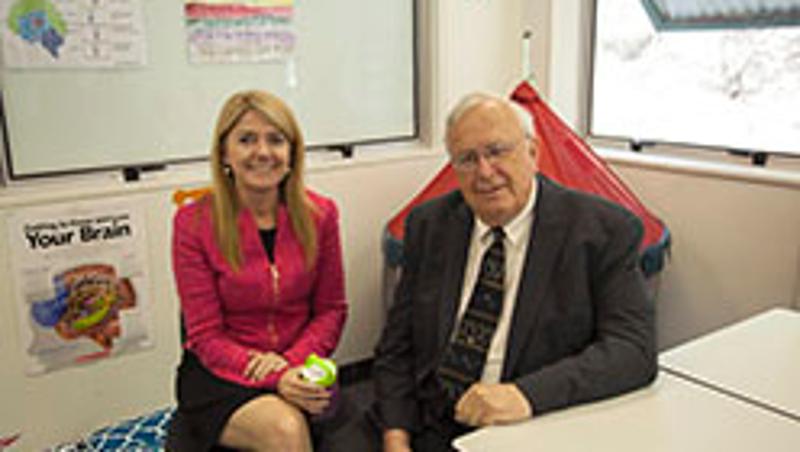
A QUT neuroscientist says advances in brain imaging technology provide solid evidence that brains can be retrained.
Professor Selena Bartlett has joined forces with master teacher in evidence-based neuroplasticity programs Sheryl Batchelor to develop Australia's first NeuroSPARK Brain Fitness Lab at QUT's Kelvin Grove campus.
Professor Bartlett said a host of problems from children struggling with emotions and learning to obesity, alcoholism and anxiety in adults can often be traced back to a brain's poor development of foundational neural pathways.
"We're at the forefront of 'clinical neuroscience meets education' and this knowledge needs to spread through the health and education system and society in general," Professor Bartlett said.
"A traumatic experience in childhood can lead to a child acting up at school, for example being disrespectful or even violent towards teachers and other students. This can be because something in the school environment has triggered a survival response from the primitive part of the child's brain, the amygdala.
"The evidence-based neuroplasticity programs we employ strength neural pathways in the brain and provide tools and strategies they can use to help them understand how to calm their amygdala to realise that they are not under threat, so they can keep that primitive part of their brain under control."
Ms Batchelor, who Directs the NeuroSPARK Lab at QUT said she had worked with children, youth and adults and could attest first-hand to the difference retraining their brains could make.
"Once we explain to children and adults how their brain works and that their behavior is caused by parts of their emotional brain taking control, they can take a step back, use the neuroplasticity-based programs we provide to improve the brain's ability to self-control, make better decisions and learn.
"It's a concept that kids get. From there they can go on to improve their literacy and numeracy skills.
"It is difficult for a child who is anxious, for example who lives in fear of a parent abandoning them, to function well at school because as soon as something happens that brings that anxiety to the fore, they will react with their primitive brain.
"That then sets off a negative reaction from the school, be that being removed from the classroom, a difficult relationship with their teacher, suspension or expulsion."
Professor Bartlett and Ms Batchelor said this wasn't just about teaching behavior but providing neuroplasticity-based brain fitness programs that retrain and strengthen the brain. The brain is not a static organ, it can be changed and we can prove this through brain imaging.
They said people were familiar with the term Post Traumatic Stress Disorder in terms of war veterans but the disorder was much more widespread within the community.
"I'm currently working with a 39-year-old tow-truck driver who attended an horrific traffic accident in Brisbane last year, the result of which left him isolated and seeking refuge in alcohol," Professor Bartlett said.
"Alcohol dependence is a common reaction to trauma.
"But with strategies in place to retrain his brain, this man is now getting his life back in order."
Professor Bartlett said an ability to retrain the brain needed to become commonplace, not only for those who had suffered trauma, but for the wider community as we are all ageing and this impacts the brain.
"According to a recent OECD report, Skills for Social Progress, it will be essential that all systems of government, corporations, businesses and families prepare children, adolescents and adults for the knowledge economy by using evidence-based neuroplasticity and brain fitness strategies. Brains need to be prepared for learning and managing emotions.
"To succeed in the workplaces of the future people will need to be increasingly adaptable and training our brains to not just cope with but to relish change will be crucial."
World expert on brain redesign, neuroscientist and Professor Emeritus at the University of California in San Francisco Professor Michael Merzenich, is coming to Australia to meet with Professor Bartlett and Ms Batchelor earlier this week.
He will be a key speaker at a Future Ways of Thinking conference at QUT today Wednesday 29 July and attend a key speaker at a forum on education and learning where he will address teachers, principals and young care workers on Thursday 30 July. He will meet with officers from the Department of communities, Child Safety and Disability Services on Friday.
Professor Bartlett said brain plasticity and brain retraining was a new frontier in neuroscience and is a revolution where brain health programs will be adopted as physical fitness programs are today. Applying practical neuroscience tools that help people look after their brain will help individuals and society lead better lives.
For further information contact Sheryl Batchelor: sheryl.batchelor@qut.edu.au
Media contact: Rose Trapnell, QUT media team leader, 07 3138 2361 or 0407 585 901 rose.trapnell@qut.edu.au




